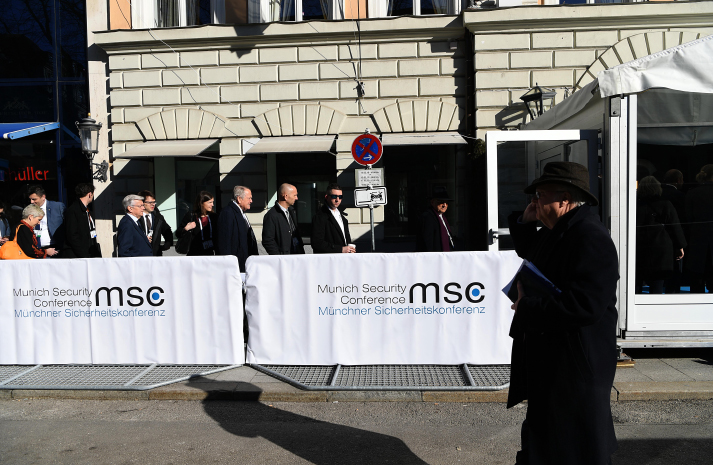| Opinion |
| Sliding Into Uncertainty | |
| Transatlantic ties, already strained, face more challenges under the Trump administration | |
|
|
 A man walks past the security check area for the 55th Munich Security Conference in Munich, Germany, on February 15 (XINHUA)
 When the 55th Munich Security Conference (MSC), the annual gathering to discuss international security issues in Munich, Germany, was held from February 15 to 17, perhaps in an attempt to make up for its absence at the World Economic Forum annual meeting in Davos, Switzerland, in January, the United States sent a large delegation. The "Davos" of security policy was attended by Vice President Mike Pence and acting Secretary of Defense Patrick Shanahan, followed by senior Senator Lindsey Graham and Speaker of the House of Representatives Nancy Pelosi. When the 55th Munich Security Conference (MSC), the annual gathering to discuss international security issues in Munich, Germany, was held from February 15 to 17, perhaps in an attempt to make up for its absence at the World Economic Forum annual meeting in Davos, Switzerland, in January, the United States sent a large delegation. The "Davos" of security policy was attended by Vice President Mike Pence and acting Secretary of Defense Patrick Shanahan, followed by senior Senator Lindsey Graham and Speaker of the House of Representatives Nancy Pelosi. However, those politicians could not help bring transatlantic relations back on track, nor did they inject new vitality into the partnership, leaving the alliance to slide into an unknown future.
Munich Security Conference (MSC) Chair Wolfgang Ischinger delivers the opening remarks during the 55th MSC in Munich, Germany, on February 15 (XINHUA)
Transatlantic camaraderie? The conference was marked by tensions between the United States and European countries, both overt and covert. At the very beginning of the meeting, MSC Chairman Wolfgang Ischinger went all out to criticize U.S. President Donald Trump. In the opening speech, he said the Ukrainian crisis had long been regarded as the primary cause of the current global instability until he realized that the U.S. president himself had become the biggest challenge to the current international order. Ischinger's remarks suggested that Europe has no intention to conceal its resentment against the Trump administration. The next day, German Chancellor Angela Merkel vowed in a passionate speech to uphold multilateralism, not withdraw from the Iranian nuclear deal, and support the Nord Stream 2 project that will provide natural gas from Russia to Europe through Germany. She also defended increasing Germany's defense spending to 1.5 percent of GDP in 2024. Accusing the Trump administration of imposing new tariffs against Germany, she questioned how importing cars from allies could be a security threat to the United States. Having announced that she won't run for another term as chancellor and will withdraw from German politics, Merkel was not encumbered by any future plans or constraints and was free to express her views. With French President Emmanuel Macron grappling with the Yellow Vest protest movement, British Prime Minister Theresa May mired in Brexit, and the Italian populist government busy with the European Parliament elections in May, where traditional parties will fight EU-skeptic parties, Merkel, whether she admits it or not, has already taken the lead in Europe's clash with Trump. The U.S. delegation came prepared. In his speech, Pence continued to urge European leaders to spend more on defense, saying "Many of our NATO allies still need to do more." He also urged Europe to stop "undermining U.S. sanctions" on Iran and explicitly asked Britain, France and Germany to withdraw from the Iranian nuclear deal though the United States had once claimed to respect the attitudes of other sovereign states on the issue. In response to Turkey purchasing Russian air defense weapons, he said, "We cannot ensure the defense of the West if our allies grow dependent on the East." This was the second time Pence had attended the MSC as U.S. vice president. Although he extended a partial olive branch to allies, saying "America first doesn't mean America alone," he played down the U.S. security commitment to Europe, saying the increase in U.S. military power meant the commitment had been delivered. He also took the opportunity to provoke dissension within the EU by praising the European countries opposed to the construction of the Nord Stream 2 pipeline. Pence laid more emphasis on Trump's achievements, attributing the increase in Europe's military spending in recent years to him and praising him as the leader of the "free world." There were several embarrassing moments. An awkward silence prevailed when Pence conveyed Trump's greetings and boasted of the U.S. president's "achievements." Annegret Kramp-Karrenbauer, the new leader of Germany's ruling Christian Democratic Union and a popular candidate for Germany's next chancellor, did not speak with Ivanka Trump when they met at breakfast. As The New York Times put it, the MSC had sung a requiem for the West. An ally or vassal? At the beginning of Trump's presidency, Europe still had expectations, speculating that his policies and actions would draw closer to the mainstream and normal U.S.-European relations would ensue. However, the expected honeymoon between the United States and Europe did not materialize. Instead, the transatlantic relations fell into turmoil. The MSC signaled the growing frustration of European countries. But the United States still continues on its own path, which is a sign that the transatlantic relationship, under the Trump administration, is becoming more disheartening. Trump's expectations from Europe are tasks that cannot be accomplished. His strong pressure on Europe to raise its defense spending, imposing additional tariffs on imports from the EU and ignoring European concerns on regional security issues, all serve as weapons to force Europe to follow his "America first" policy. His aim is to shape a unipolar world led by the United States, with Europe supporting the United States in terms of security, the economy as well as international affairs. In short, what the Trump administration wants is not an ally but a vassal. However, Europe is independent and economically the United States' equal, upholds pluralism and pursues a multipolar world. Even if it depends on the United States for security, Trump's vision is a clear violation of European values and fundamentals and can never be complied with. On the other hand, Europe's attempt to tame Trump is also a pipe dream. Europe is not capable of challenging the strength of the United States, unable to keep up with the innovation ability of the U.S. economy, its demographic structure as well as the dollar's monopoly and unique financial capabilities. The Trump administration, although it suffered setbacks in the mid-term elections in 2018, has a more uniform foreign policy today. The frequent changes in Trump's appointees have enabled him to follow his own will. In Pence's speech at the MSC, he mentioned Trump 30 times, twice as many times as in his first speech in 2017. This was not a coincidence, but highlighted the expansion of Trump's control over U.S. foreign policy. Europe, realizing this, is arranging a strategic layout for a post-Trump era. During the MSC, Pelosi was invited to a night seminar for the U.S. Congress delegation. Of the four speakers at the event, only one was from Trump's Republican Party. Former Democratic Vice President Joe Biden, who may run for the next U.S. presidential election in 2020, was given an unprecedented warm applause, in stark contrast to the European reaction to Pence's speech. Besides, Europe's ambition for strategic autonomy is being implemented step by step by building up its defense capabilities and maintaining economic sovereignty. European countries are also preparing to meet more like-minded partners around the world. According to the 2019 Munich Security Report, the annual report of the MSC, "a new era of great power competition is unfolding between the United States, China and Russia, accompanied by a certain leadership vacuum in what has become known as the liberal international order." With the implication that the United States is no longer qualified to sustain its leadership over Europe, Europe itself has the potential to fill the leadership vacuum in the West. The crisis of transatlantic relations in the Trump era offers a rare opportunity and motivation for European integration. The author is an associate researcher with the Institute of European Studies under the China Institutes of Contemporary International Relations Copyedited by Sudeshna Sarkar Comments to yulintao@bjreview.com |
|
||||||||||||||||||||||||||||
|